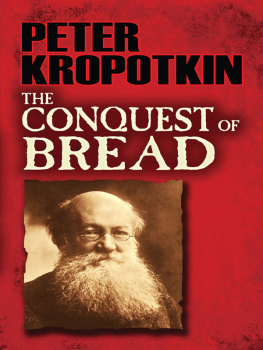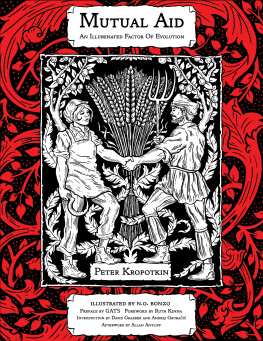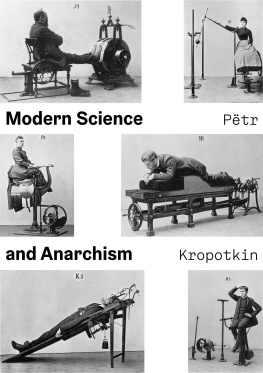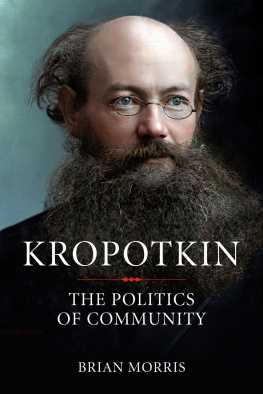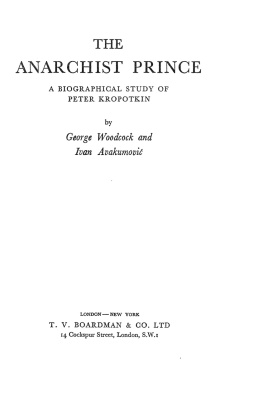Kropotkin - Anarchist Communism: Its Basis and Principles
Here you can read online Kropotkin - Anarchist Communism: Its Basis and Principles full text of the book (entire story) in english for free. Download pdf and epub, get meaning, cover and reviews about this ebook. City: London, year: 1925, publisher: Freedom Publications;Text::Muse, genre: Politics. Description of the work, (preface) as well as reviews are available. Best literature library LitArk.com created for fans of good reading and offers a wide selection of genres:
Romance novel
Science fiction
Adventure
Detective
Science
History
Home and family
Prose
Art
Politics
Computer
Non-fiction
Religion
Business
Children
Humor
Choose a favorite category and find really read worthwhile books. Enjoy immersion in the world of imagination, feel the emotions of the characters or learn something new for yourself, make an fascinating discovery.

- Book:Anarchist Communism: Its Basis and Principles
- Author:
- Publisher:Freedom Publications;Text::Muse
- Genre:
- Year:1925
- City:London
- Rating:3 / 5
- Favourites:Add to favourites
- Your mark:
- 60
- 1
- 2
- 3
- 4
- 5
Anarchist Communism: Its Basis and Principles: summary, description and annotation
We offer to read an annotation, description, summary or preface (depends on what the author of the book "Anarchist Communism: Its Basis and Principles" wrote himself). If you haven't found the necessary information about the book — write in the comments, we will try to find it.
Anarchist Communism: Its Basis and Principles — read online for free the complete book (whole text) full work
Below is the text of the book, divided by pages. System saving the place of the last page read, allows you to conveniently read the book "Anarchist Communism: Its Basis and Principles" online for free, without having to search again every time where you left off. Put a bookmark, and you can go to the page where you finished reading at any time.
Font size:
Interval:
Bookmark:
Retrieved on June 24, 2009 from dwardmac.pitzer.edu
Anarchism, the no-government system of socialism, has a double origin. It is an outgrowth of the two great movements of thought in the economic and the political fields which characterize the nineteenth century, and especially its second part. In common with all socialists, the anarchists hold that the private ownership of land, capital, and machinery has had its time; that it is condemned to disappear; and that all requisites for production must, and will, become the common property of society, and be managed in common by the producers of wealth. And in common with the most advanced representatives of political radicalism, they maintain that the ideal of the political organization of society is a condition of things where the functions of government are reduced to a minimum, and the individual recovers his full liberty of initiative and action for satisfying, by means of free groups and federations freely constituted all the infinitely varied needs of the human being.
As regards socialism, most of the anarchists arrive at its ultimate conclusion, that is, at a complete negation of the wage-system and at communism. And with reference to political organization, by giving a further development to the above-mentioned part of the radical program, they arrive at the conclusion that the ultimate aim of society is the reduction of the functions of government to nil that is, to a society without government, to anarchy. The anarchists maintain, moreover, that such being the ideal of social and political organization, they must not remit it to future centuries. but that only those changes in our social organization which are in accordance with the above double ideal, and constitute an approach to it, will have a chance of life and be beneficial for the commonwealth.
As to the method followed by the anarchist thinker, it entirely differs from that followed by the utopists. The anarchist thinker does not resort to metaphysical conceptions (like natural rights, the duties of the State, and so on) to establish what are, in his opinion, the best conditions for realizing the greatest happiness of humanity. He follows, on the contrary, the course traced by the modern philosophy of evolution. He studies human society as it is now and was in the past; and without either endowing humanity as a whole, or separate individuals, with superior qualities which they do not possess, he merely considers society as an aggregation of organisms trying to find out the best ways of combining the wants of the individual with those of cooperation for the welfare of the species. He studies society and tries to discover its tendencies past and present, its growing needs, intellectual and economic, and in his ideal he merely points out in which direction evolution goes. He distinguishes between the real wants and tendencies of human aggregations and the accidents (want of knowledge, migrations, wars, conquests) which have prevented these tendencies from being satisfied. And he concludes that the two most prominent, although often unconscious, tendencies throughout our history have been: first, a tendency towards integrating labor for the production of all riches in common, so as finally to render it impossible to discriminate the part of the common production due to the separate individual; and second, a tendency towards the fullest freedom of the individual in the prosecution of all aims, beneficial both for himself and for society at large. The ideal of the anarchist is thus a mere summing up of what he considers to be the next phase of evolution. It is no longer a matter of faith; it is a matter for scientific discussion.
In fact, one of the leading features of this century is the growth of socialism and the rapid spreading of socialist views among the working-classes. How could it be otherwise? We have witnessed an unparalleled sudden increase of our powers of production, resulting in an accumulation of wealth which has outstripped the most sanguine expectations. But owing to our wage system, this increase of wealth due to the combined efforts of men of science, of managers, and workmen as well has resulted only in an unprecedented accumulation of wealth in the hands of the owners of capital; while an increase of misery for great numbers, and an insecurity of life for all, have been the lot of the workmen The unskilled laborers, in continuous search for labor, are falling into an unheard-of destitution. And even the best paid artisans and skilled workmen labor under the permanent menace of being thrown, in their turn, into the same conditions as the unskilled paupers, in consequence of some of the continuous and unavoidable fluctuations of industry and caprices of capital.
The chasm between the modern millionaire who squanders the produce of human labor in a gorgeous and vain luxury, and the pauper reduced to a miserable and insecure existence, is thus growing wider and wider, so as to break the very unity of society the harmony of its life and to endanger the progress of its further development.
At the same time, workingmen are less and less inclined to patiently endure this division of society into two classes, as they themselves become more and more conscious of the wealth-producing power of modern industry, of the part played by labor in the production of wealth, and of their own capacities of organization. In proportion as all classes of the community take a more lively part in public affairs, and knowledge spreads among the masses, their longing for equality becomes stronger, and their demands for social reorganization become louder and louder. They can be ignored no more. The worker claims his share in the riches he produces; he claims his share in the management of production; and he claims not only some additional well-being, but also his full rights in the higher enjoyments of science and art. These claims, which formerly were uttered only by the social reformer, begin now to be made by a daily growing minority of those who work in the factory or till the acre. And they so conform to our feelings of justice that they find support in a daily growing minority among the privileged classes themselves. Socialism becomes thus the idea of the nineteenth century; and neither coercion nor pseudo-reforms can stop its further growth.
Much hope of improvement was placed, of course, in the extension of political rights to the working classes. But these concessions, unsupported as they were by corresponding changes in economic relations, proved delusions. They did not materially improve the conditions of the great bulk of the workmen. Therefore, the watchword of socialism is: Economic freedom as the only secure basis for political freedom. And as long as the present wage system, with all its bad consequences, remains unaltered, the socialist watchword will continue to inspire the workmen. Socialism will continue to grow until it has realized its program.
Side by side with this great movement of thought in economic matters, a like movement has been going on with regard to political rights, political organization, and the functions of government. Government has been submitted to the same criticism as capital. While most of the radicals saw in universal suffrage and republican institutions the last word of political wisdom, a further step was made by the few. The very functions of government and the State, as also their relations to the individual, were submitted to a sharper and deeper criticism. Representative government having been tried by experiment on a wide field, its defects became more and more prominent. It became obvious that these defects are not merely accidental but inherent in the system itself. Parliament and its executive proved to be unable to attend to all the numberless affairs of the community and to conciliate the varied and often opposite interests of the separate parts of a State. Election proved unable to find out the men who might represent a nation, and manage, otherwise than in a party spirit, the affairs they are compelled to legislate upon. These defects become so striking that the very principles of the representative system were criticized and their justness doubted.
Font size:
Interval:
Bookmark:
Similar books «Anarchist Communism: Its Basis and Principles»
Look at similar books to Anarchist Communism: Its Basis and Principles. We have selected literature similar in name and meaning in the hope of providing readers with more options to find new, interesting, not yet read works.
Discussion, reviews of the book Anarchist Communism: Its Basis and Principles and just readers' own opinions. Leave your comments, write what you think about the work, its meaning or the main characters. Specify what exactly you liked and what you didn't like, and why you think so.


